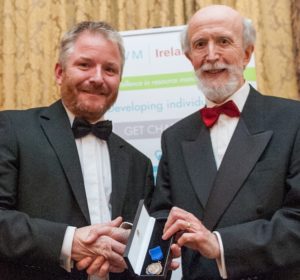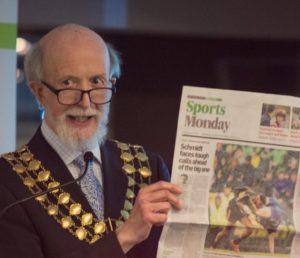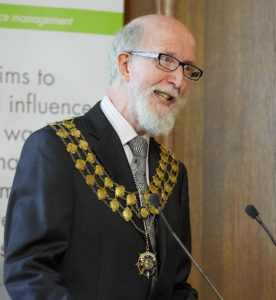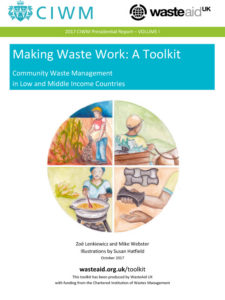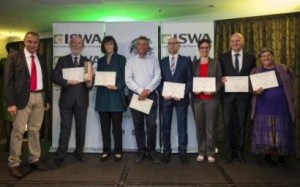DCW wins the 2022 ISWA Publication Award
It is indeed nice to have your work recognised! My co-authors Andy Whiteman and Mike Webster will receive the 2022 ISWA Publication Award this week at the ISWA World Congress Gala Dinner in Singapore, for our conceptual framework and global theory of waste and development, The Nine Development Bands. The 9DBs was published open access last year and is a powerful addition to the practitioner’s toolkit, bringing depth and nuance to understanding waste and resource management systems globally and helping you to focus your time and resources on achieving maximum impact. I am proud of all five of my ISWA Publication Awards over the last 20 years!
Hazardous Waste – Plus ça Change
CIWM President, and Chair of CIWM’s Hazardous Waste Special Interest Group (SIG), David C Wilson reflects in his August CIWM column on the challenges facing hazardous waste management in the UK and Ireland – past, present and future. His review with the SIG of current challenges suggests that not much has changed over the 44 years of his involvement with the hazardous waste sector. In particular, the UK continues to lack the ‘regulatory certainty’ which is necessary to secure the investment required in hazardous waste management infrastructure if such investment is left entirely to ‘the market’. And looking at the island of Ireland in particular, the uncertainties around Brexit do not help.
Don’t waste our climate
In his July column, CIWM President David C Wilson makes the case for more investment in resource and waste management as an ‘entry point’ to achieve significant climate mitigation. The sector already has a track record in developed countries, with methane mitigation from landfill since the 1970s, and both methane mitigation and recycling making a major contribution to meeting Kyoto Convention greenhouse gas (GHG) reduction targets between 1990 and 2010. But that early success also means that the IPCC’s 2010 assessment is that the ‘waste’ sector only contributes 3-5% to current GHG emissions. DCW argues that this is a gross underestimate which fails to consider: the current emissions from uncontrolled burning; historical reductions; contributions across the economy from recycling; and waste prevention (particularly food waste). The results suggest that better resource and waste management has the potential for reducing GHG emissions across the World economy by 15, 20 or 25% or even more. Such numbers may be guesstimates, but whatever number we choose to use, the message is still the same. Further investment in this sector, in both developing and developed countries, is a major political priority in order to meet our climate targets.
CIWM success in influencing policy
DCW’s Presidential year at CIWM continues to be dominated by marine plastics. As part of our efforts to influence developing UK policy in this area, CIWM and Wasteaid published a report: ‘FROM THE LAND TO THE SEA: How better solid waste management can improve the lives of the world’s poorest and halve the quantity of plastic entering the oceans’. His June CIWM column reports success: the day before the biennial Commonwealth Heads of Government Meeting in London in April, Theresa May announced a new Commonwealth Clean Oceans Alliance (CCOA) backed by a £61.4 million funding package of funding to help tackle marine plastics, of which more than £20 million would help developing country members of the CCOA improve waste management at a national and city level.
Revaluing Recycling
Europe and North America have a problem with sustainable recycling. China’s ban on imports has thrown the problem into sharp focus: where are the markets for the materials we are collecting for recycling to meet the targets? And how do local authorities balance their already curtailed budgets as prices for recycled materials plummet? DCW’s May CIWM column explores the history of recycling over the last 40 years, and concludes that our existing policy support measures, focusing on increasing supply rather than demand, are not fit for purpose. He argues that we need to rethink recycling to make it a sustainable foundation for our future circular economy; and makes the case for considering explicitly the embodied social, environmental and technical values alongside the market price.
Uncontrolled burning of solid waste as a significant contributor to climate change
To qualify for inclusion in the official (IPCC) inventory of greenhouse gases (GHGs), data for an emission source must meet a quality threshold. This currently excludes black carbon emissions from the open burning of wastes. The relative quantities may be small compared to carbon dioxide from fossil fuels or methane from landfill, but black carbon is around 2,000 more powerful than CO₂ as a GHG. In the absence of real data, early modelling studies using broad assumptions suggested that black carbon from open burning contributes 5% of total global GHG emissions, causing 270,000 premature deaths a year. DCW’s PhD student at Imperial College London, Natalia Reyna, has been working for the last four years to provide real data which would meet the IPCC requirements. Our first paper, published this month in the leading journal Environmental Research, presents field data from Mexico on how much solid wastes are disposed of by open burning, either by households or at uncontrolled dumpsites. The results suggest a GHG contribution from uncontrolled burning in backyards in Mexico fifteen times larger compared to methane released from the decomposition of equivalent amounts of waste in a disposal site. A future paper will present data on emission factors, i.e. how much black carbon is produced by burning a kilogram of waste.
China: Coming Full Circle
China’s recent import ban has thrown Western recycling systems into disarray. DCW has participated as CIWM President in three regional open meetings to address the ‘China recycling crisis’. His April column for the CIWM Journal has written up his presentation, providing a personal perspective on how he has seen China’s internal resource and waste management systems develop over the last 40 years. Arguably, its 1970s system could be viewed as an early example of a circular economy. The transition to ‘market -oriented’ operations led to economic growth being prioritised over environmental protection. But the current ‘National Sword’ campaign is just one symptom of a fundamental change, suggesting that, going forward, perhaps China really could lead the world in transitioning to a circular economy.
DCW wins 2024 ISWA Publication Award
DCW won the 2024 ISWA Publication Award for his magnum opus, looking back over his long career at the evolution of waste and resource management since the first environmental control legislation in the 1970s, and reflecting on current and future priorities.
DCW awards his Presidential Medal
DCW awarded his CIWM Presidential Medal for 2018 to Mike Webster, the founder and CEO of the new charity Wasteaid, which is working directly with local communities to tackle the global waste crisis.
DCW hands over CIWM Presidency
DCW handed over to Enda Kiernan at the Aviva Stadium in Dublin on 13th November 2018. The Gaelic Football team which Enda manages appeared in the lead photo story of the previous day’s Irish Times.
DCW inaugurated as CIWM President
Professor David C Wilson giving his inauguration speech as CIWM President 2017 at Church House Westminster in October 2017. His theme for the year was solid waste management as the forgotten utility service, underpinning modern society.
DCW’s CIWM Presidential Report 2017
DCW commissioned WasteAid UK to prepare a practical toolkit for poor communities on how to make useful products from the low-value plastics and organics in their waste. In its first year, the website was visited 56,000 times, with 7,000 downloads of the toolkit.
ISWA Publication Award 2015
DCW with co-authors Ljiljana Rodic, Andy Whiteman, Costas Velis, Barbara Oelz, Joachim Stretz and Anne Scheinberg, receiving the Award from ISWA Scientific and Technical Committee Chair Antonis Mavropoulos (left), at the ISWA 2015 World Congress in Antwerp on Tuesday 08 September.

